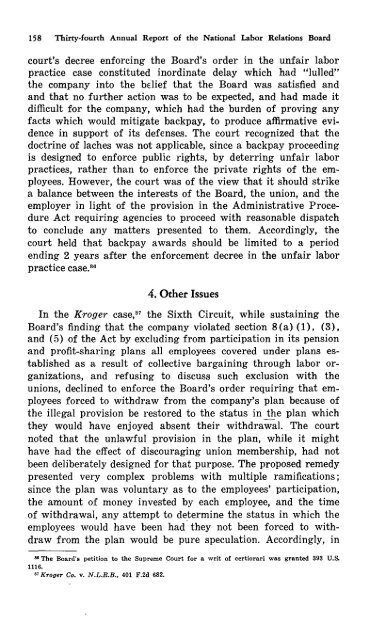1 - National Labor Relations Board
1 - National Labor Relations Board
1 - National Labor Relations Board
You also want an ePaper? Increase the reach of your titles
YUMPU automatically turns print PDFs into web optimized ePapers that Google loves.
158 Thirty-fourth Annual Report of the <strong>National</strong> <strong>Labor</strong> <strong>Relations</strong> <strong>Board</strong><br />
court's decree enforcing the <strong>Board</strong>'s order in the unfair labor<br />
practice case constituted inordinate delay which had "lulled"<br />
the company into the belief that the <strong>Board</strong> was satisfied and<br />
and that no further action was to be expected, and had made it<br />
difficult for the company, which had the burden of proving any<br />
facts which would mitigate backpay, to produce affirmative evidence<br />
in support of its defenses. The court recognized that the<br />
doctrine of laches was not applicable, since a backpay proceeding<br />
is designed to enforce public rights, by deterring unfair labor<br />
practices, rather than to enforce the private rights of the employees.<br />
However, the court was of the view that it should strike<br />
a balance between the interests of the <strong>Board</strong>, the union, and the<br />
employer in light of the provision in the Administrative Procedure<br />
Act requiring agencies to proceed with reasonable dispatch<br />
to conclude any matters presented to them. Accordingly, the<br />
court held that backpay awards should be limited to a period<br />
ending 2 years after the enforcement decree in the unfair labor<br />
practice case.86<br />
4. Other Issues<br />
In the Kroger case, 87 the Sixth Circuit, while sustaining the<br />
<strong>Board</strong>'s finding that the company violated section 8 (a) (1), (3),<br />
and (5) of the Act by excluding from participation in its pension<br />
and profit-sharing plans all employees covered under plans established<br />
as a result of collective bargaining through labor organizations,<br />
and refusing to discuss such exclusion with the<br />
unions, declined to enforce the <strong>Board</strong>'s order requiring that employees<br />
forced to withdraw from the company's plan because of<br />
the illegal provision be restored to the status in the plan which<br />
they would have enjoyed absent their withdrawal. The court<br />
noted that the unlawful provision in the plan, while it might<br />
have had the effect of discouraging union membership, had not<br />
been deliberately designed for that purpose. The proposed remedy<br />
presented very complex problems with multiple ramifications ;<br />
since the plan was voluntary as to the employees' participation,<br />
the amount of money invested by each employee, and the time<br />
of withdrawal, any attempt to determine the status in which the<br />
employees would have been had they not been forced to withdraw<br />
from the plan would be pure speculation. Accordingly, in<br />
86 The <strong>Board</strong>'s petition to the Supreme Court for a writ of certiorari was granted 393 U.S.<br />
1116.<br />
ST Kroger Co. v. N.L.R.B., 401 F.2d 682.

















